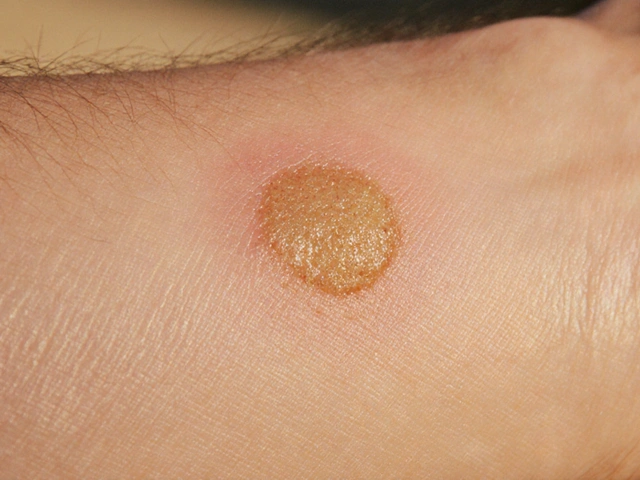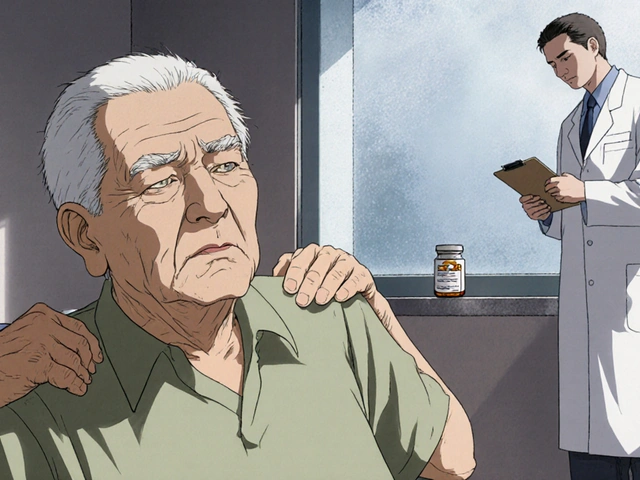Key takeaways:
- Liver cancer can change hormones, energy levels, and body image, all of which impact sexual desire.
- Different treatments (chemotherapy, radiation, targeted therapy) have distinct side‑effects on libido and performance.
- Open communication with partners and health‑care teams is essential for maintaining intimacy.
- Therapies such as counseling, pelvic floor exercises, and medication can help restore sexual health.
- Planning ahead for fertility, pain management, and palliative care eases long‑term concerns.
Understanding the Core Issue
Liver cancer is a malignant disease that originates in the liver cells, often diagnosed through imaging and blood tests. It progresses quickly, affecting liver function, hormonal balance, and overall vitality. According to the World Health Organization, liver cancer accounts for roughly 8% of global cancer deaths, highlighting its seriousness.
When a liver tumor disrupts normal organ function, patients frequently notice fatigue, nausea, and weight loss. These physical changes spill into the bedroom, making desire and performance feel like distant concepts.
Sexuality is a multidimensional aspect of human life that includes desire, arousal, intimacy, and emotional connection. It is influenced by physical health, hormones, mental state, and relational dynamics.
For anyone facing a serious diagnosis, the intersection of disease and sexuality becomes a delicate dance. Understanding how each piece fits together lets patients and partners take proactive steps.
How Liver Cancer Treatments Influence Intimacy
Every treatment route carries its own set of side effects that can affect sexual health. Below is a concise snapshot of the most common modalities.
| Treatment | Typical Sexual Impact | Management Options |
|---|---|---|
| Chemotherapy is a systemic drug regimen that attacks rapidly dividing cells. | Reduced libido, temporary erectile dysfunction, vaginal dryness. | Dose adjustment, phosphodiesterase inhibitors, lubricants. |
| Radiation therapy targets tumor tissue with high‑energy beams. | Localized fatigue, skin changes, potential nerve irritation affecting sensation. | Physical therapy, nerve‑protective meds, timing intimacy away from treatment days. |
| Targeted therapy attacks specific molecular pathways in cancer cells. | Hormonal fluctuations, mood swings, occasional skin rash that can affect body confidence. | Endocrine consulting, mood‑stabilizing strategies, skin‑care regimens. |
Aside from these primary modalities, patients may also undergo Hormonal changes due to liver dysfunction, which can lower testosterone or estrogen levels, directly dampening desire.
Understanding the exact cause-whether it’s the drug itself, fatigue, or hormonal shift-helps clinicians prescribe the right supportive therapy.
Psychological Factors That Complicate Desire
Physical symptoms are only half the story. Psychological distress includes anxiety, depression, and fear of disease progression. Studies from the National Cancer Institute show that up to 40% of liver cancer patients report clinically significant depression, a known inhibitor of libido.
Body image issues also surface. A scar from surgery or a visible stoma can make patients feel “less attractive.” This is where Body image-the perception of one’s own appearance-plays a critical role. Positive body‑image interventions, such as supportive clothing and mirror‑based therapy, have been linked to improved sexual satisfaction.
When mental struggle meets physical limitation, intimacy can feel out of reach. The good news: mental health services, including counseling and support groups, can dramatically improve outcomes.
Partner Communication: The Lifeline of Intimacy
Open dialogue with a partner is often the single most effective tool. A study published in the Journal of Clinical Oncology found that couples who discussed their fears and needs reported a 30% higher satisfaction rate despite ongoing treatment.
Practical tips for conversation:
- Pick a calm, private time-no TV, no phones.
- Use “I” statements: “I feel worried about my energy levels tonight.”
- Ask specific questions: “Would a gentle massage help us stay connected?”
- Agree on a “check‑in” routine, perhaps once a week, to reassess desires and boundaries.
When the communication channel is clear, couples can experiment with new forms of intimacy-cuddling, massages, or sharing fantasies-without the pressure of performance.

Therapeutic Interventions to Rekindle Intimacy
Several evidence‑based interventions can ease sexual difficulties:
- Pelvic floor physical therapy: Strengthens muscles involved in arousal and orgasm; especially helpful after surgery.
- Medication: Phosphodiesterase‑5 inhibitors for men, vaginal moisturizers for women, and low‑dose hormonal therapy when appropriate.
- Sex therapy: A certified sex therapist works with both partners to address emotional blocks and teach techniques for pleasure.
- Mind‑body practices: Yoga, meditation, and guided breathing reduce stress hormones that suppress sexual desire.
Choosing the right mix depends on the individual’s health status, treatment schedule, and personal comfort.
Planning for the Future: Fertility, Pain, and Palliative Care
Even if you’re not planning a family right now, discussing fertility preservation early-before chemotherapy or targeted therapy-can keep options open. Cryopreservation of sperm or oocytes is standard practice in many oncology centers.
Chronic pain, especially abdominal discomfort, can make any sexual activity uncomfortable. pain management strategies like low‑dose opioids, gabapentin, or nerve blocks can improve quality of life. Work with a palliative‑care team to balance symptom control with cognitive clarity.
In later stages, focus may shift from performance to closeness. Simple gestures-holding hands, soft whispers, skin‑to‑skin contact-remain powerful expressions of love.
Connecting the Dots: Related Topics to Explore
Understanding intimacy in the context of liver cancer opens doors to broader health conversations. Readers might also benefit from exploring:
- Nutrition and energy levels: How diet can boost stamina for intimacy. \n
- Psychological resilience: Coping mechanisms for long‑term survivorship.
- Alternative therapies: Acupuncture or massage for symptom relief.
Each of these topics intersects with the core entities discussed, creating a holistic care network.
Frequently Asked Questions
Can liver cancer treatment cause permanent loss of sexual function?
Most side‑effects are temporary. Chemotherapy‑induced erectile dysfunction often improves within months after the cycle ends. However, severe liver damage or nerve injury from radiation can lead to lasting changes, which is why early intervention and rehabilitation are critical.
Is it safe to use lubricants and sex toys during treatment?
Yes, water‑based lubricants are generally safe and can reduce friction caused by vaginal dryness. Silicone toys are also fine, but avoid those with strong scents or chemicals that might irritate sensitive skin.
How can I talk to my oncologist about sexual side‑effects?
Prepare a short list of concerns, mention specific symptoms (e.g., low libido, pain), and ask for referrals to a sex therapist or pelvic floor specialist. Most oncologists recognize the importance of sexual health and will provide supportive resources.
What role does mental health counseling play in restoring intimacy?
Counseling addresses anxiety, depression, and body‑image issues that often suppress desire. Cognitive‑behavioral therapy and couples counseling have shown a 25% improvement in sexual satisfaction scores among cancer patients.
Are there any medications that can help with low libido caused by liver cancer?
Options include testosterone replacement for men (under strict monitoring), bupropion for both genders, and selective estrogen receptor modulators for women. All require a physician’s oversight due to liver metabolism considerations.






Natalie Goldswain
26 September 2025 - 13:08 PM
Water‑based lubricants are totally fine during chemo, they won’t irritate skin.
Try a silicone‑based toy only if you’re sure it’s fragrance‑free.
khajohnsak Mankit
27 September 2025 - 14:08 PM
The hormonal roller‑coaster of liver cancer can feel like a sunrise trapped in a storm, each surge of estrogen or testosterone painting new shadows on desire.
When radiation whispers fatigue into the night, the body’s orchestra mutes its strings, but a gentle melody of mindfulness can coax the rhythm back.
Remember, intimacy isn’t just a physical act; it’s a collage of scent, touch, and shared breath.
Jayant Paliwal
28 September 2025 - 15:08 PM
Chemotherapy, while targeting malignant cells, often casts a wide net over the endocrine system, leaving testosterone levels dangling like a loose thread in men and estrogen imbalances in women, which in turn dim the spark of libido.
The patients frequently report a constellation of symptoms-fatigue, nausea, weight loss-each one a silent thief stealing energy needed for intimacy.
The physical exhaustion can translate into mental withdrawal, making the idea of closeness feel like climbing a steep hill after a marathon.
Beyond the drugs themselves, the liver’s compromised ability to metabolize hormones amplifies these fluctuations, creating a feedback loop that further suppresses desire.
Radiation therapy, though localized, can irritate peripheral nerves, reducing sensation in the pelvic region and making touch feel dulled or even painful.
Timing intimate moments away from treatment days often provides a respite, allowing the body to recover its natural rhythm.
Targeted therapies, with their precision, still meddle with molecular pathways that govern mood and confidence, sometimes triggering skin rashes that erode body image.
Such visible side‑effects can cast a shadow over self‑esteem, turning the bedroom into a space of self‑consciousness rather than pleasure.
Psychological distress-anxiety, depression, fear of disease progression-acts as an invisible barrier, reducing dopamine flow and stifling arousal.
Studies indicate that up to forty percent of liver cancer patients develop clinically significant depression, a statistic that underscores the need for integrated mental health support.
Couples who engage in open, non‑judgmental dialogue report higher satisfaction, as they can recalibrate expectations and share practical adjustments like gentle massages or assisted positioning.
Pelvic floor physical therapy has emerged as a valuable tool, strengthening muscles essential for orgasmic response and alleviating postoperative discomfort.
Phosphodiesterase‑5 inhibitors, when prescribed appropriately, can restore erectile function, while vaginal moisturizers address dryness without disrupting the delicate hormonal balance.
Sex therapy, led by certified professionals, equips partners with communication strategies and novel techniques that bypass performance pressure.
Mind‑body practices such as yoga, meditation, and guided breathing lower cortisol levels, creating a hormonal environment more conducive to desire.
In sum, the interplay of treatment side‑effects, hormonal shifts, psychological factors, and relational dynamics demands a multimodal approach to reclaim intimacy.
Melissa Trebouhansingh
29 September 2025 - 16:08 PM
Within the grand tapestry of oncological care, the subtle erosion of sexual vitality by hepatic malignancy emerges as a nuanced interplay of biochemical perturbations, psychosocial recalibrations, and existential re‑imagining, demanding a deliberation that transcends mere clinical checklist and invites the patient–partner dyad into a collaborative narrative of resilience, wherein hormonal dysregulation, mediated by compromised hepatic aromatase activity, coalesces with the somatic fatigue of systemic therapies to attenuate libidinal currents, while the aesthetic displeasure of surgical scars or ostomies injects a disquieting self‑perception that reverberates across intimate encounters, thereby necessitating interventions that are as sophisticated as they are compassionate, ranging from evidence‑based pelvic floor rehabilitation to the judicious prescription of phosphodiesterase‑5 inhibitors or estrogen modulators, each calibrated to the individual's metabolic constraints and psychosocial context, ultimately fostering a restored sense of corporeal agency and emotional communion;
Simultaneously, the lexicon of communication must evolve beyond perfunctory exchanges to embrace deliberate, vulnerability‑infused dialogues that articulate desire, apprehension, and adaptive strategies, thereby constructing a relational scaffold capable of withstanding the vicissitudes of treatment cycles and the inexorable march of disease progression, all while preserving the sanctity of shared pleasure and the affirmation of identity amidst clinical adversity.
Brian Rice
30 September 2025 - 17:08 PM
It is incumbent upon healthcare professionals to recognize that sexual health is not a peripheral concern but a fundamental human right, and any failure to address the intimate ramifications of liver cancer treatment constitutes a breach of ethical duty; patients deserve comprehensive counseling, appropriate pharmacologic support, and referral to qualified sex therapists without being subjected to stigma or dismissal.
Stan Oud
1 October 2025 - 18:08 PM
Honestly, most of this sounds like overkill.
Grover Walters
2 October 2025 - 19:08 PM
One might argue that intimacy, in the context of disease, is less about physical performance and more about the metaphysical affirmation of selfhood, a dialectic wherein the body’s limitations become the canvas for relational meaning, urging partners to reconceptualize pleasure as an act of shared consciousness rather than mere sensation.
Amy Collins
3 October 2025 - 20:08 PM
From a practical standpoint, integrating pelvic floor PT and low‑dose PDE‑5 inhibitors can boost sexual function metrics, while maintaining cachexia management ensures stamina for extended sessions.
amanda luize
4 October 2025 - 21:08 PM
While the article touts “standard” therapies, one must remain vigilant about the pharmaceutical lobby's subtle influence on treatment guidelines, which may sideline natural hormone‑balancing modalities in favor of profit‑driven prescriptions; moreover, the omission of detailed dosage protocols raises questions about transparency, and any reader should demand full disclosure to avoid inadvertent complicity in a concealed agenda.
Chris Morgan
5 October 2025 - 22:08 PM
Contrary to popular belief, the emphasis on sexual rehabilitation can distract from the primary goal of tumor control and may lead patients to prioritize comfort over survival.
Pallavi G
6 October 2025 - 23:08 PM
Building on the point about ethical responsibility, consider requesting a written care plan that outlines specific sexual health assessments; many oncology centers now include a “sexual wellness” questionnaire as part of routine visits, which can streamline referrals to pelvic therapists or psychosexual counselors.
Rafael Lopez
8 October 2025 - 00:08 AM
Absolutely! I’d also suggest asking your oncologist about integrating a low‑impact yoga regimen-studies show it can lower cortisol levels, improve circulation, and enhance overall mood, thereby creating a more conducive environment for intimacy; don’t forget to document any side‑effects you experience so your care team can adjust medications promptly.